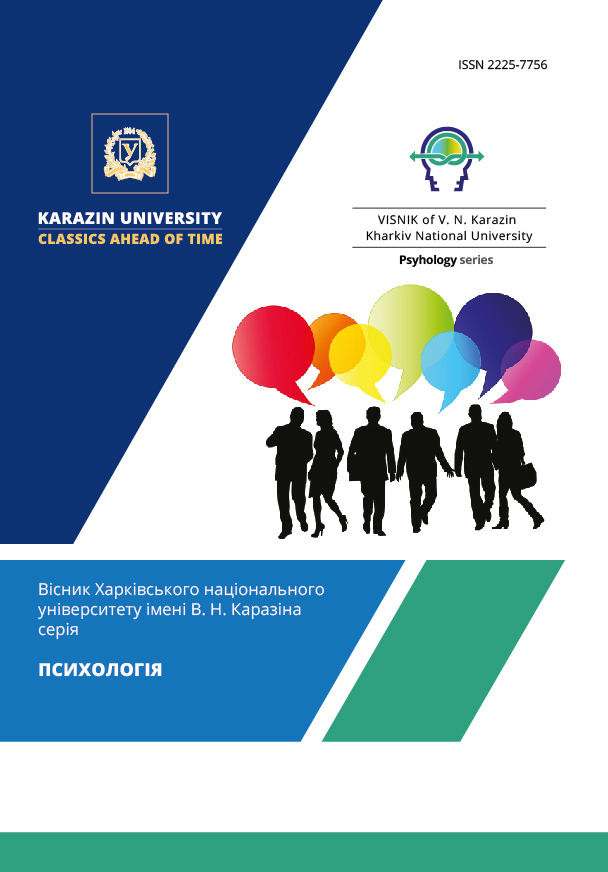Features of interpersonal relationships in adolescents with internet addiction
Abstract
The article is focused on the study of interpersonal relations in adolescents with Internet addiction. The purpose of the article is to identify the characteristics of interpersonal relationships and their relationship with Internet addiction in adolescents. To achieve the research goal, the following psychological tools were used: the «Internet Addiction Scale», the «Dialogic Interpersonal Relationships Scale», and the «Diagnosis of emotional barriers in interpersonal communication». The Kolmogorov-Smirnov criterion and Spearman's rank correlation coefficient were used for statistical processing of the results, which allow for further qualitative analysis of the data. According to the results of the study, the relationship between emotional obstacles in interpersonal communication and Internet addiction in Internet addicts and Internet independent adolescents was established. The obtained results indicate that with the growing feeling of inability to overcome the desire to access the Internet; a sense of discomfort if you have to stop using the Internet for a certain period of time, inability to control the duration of time spent for the Internet, the inability to control emotional reactions, the ability to restrain or dose the manifestations of unpleasant emotional experiences, increases internal tension, the tendency to inadequate expression of emotions is actualized; emotional reactions are more often inappropriate. As a conclusion, it can be argued that in the group of adolescents with Internet addictive behavior, with the increase in the severity of emotional barriers in interpersonal communication, a number of Internet addiction symptoms such as "inability to control emotions", "compulsive symptoms", "withdrawal symptoms", "inadequate expression of emotions", "dominance of negative emotions" and "unwillingness to get closer to people on an emotional basis" are exacerbated. The results obtained can be used to improve programmes for the prevention and correction of Internet addiction in adolescents.
Downloads
References
Atamanchuk, N. Computer addiction of adolescents. (2014). Personality and society: methodology and practice of modern psychology: materials of the First International scientific and practical Internet conference (May 13, 2014) L.V. Zasekina, A.V. Kulchytska (Eds.), (pp. 27-30) Lutsk: Vezha-druk. http://reposit.pntu.edu.ua/handle/PoltNTU/6812. [In Ukrainian]
Aymedov, K., Aseyeva, Y., Cherevko, M. (2017) Non-chemical addictions: current trends. Medical psychology. 12(1). 13-18. http://nbuv.gov.ua/UJRN/Mpsl_2017_12_1_5. [In Ukrainian]
De Abreu, C., Young, K. (2010). Internet addiction: A handbook and guide to evaluation and treatment. Hoboken, NJ, US: John Wiley & Sons https://psycnet.apa.org/record/2010-22949-000
Farafonova-Nekrasova, O. (2019). Interrelation of Internet addiction and characteristics of interpersonal relationships in adolescents. (Master's thesis). V.N. Karazin Kharkiv National University. [In Ukrainian]
Kaminska, O.V. (2016). Psychological bases of youth Internet addiction. (Abstract of Doctor of Psychology). Odesa. http://dspace.pdpu.edu.ua/bitstream/123456789/1240/. [In Ukrainian]
Kornienko, V., Nikanorova, Y., Kuleshova, T. (2013). Internet addiction as a factor of interpersonal communication disorder. Bulletin of Dnipropetrovs'k University. Series: Pedagogy and psychology. 21(19). 87-93. http://nbuv.gov.ua/UJRN/vdupp_2013_21_19_14. [In Ukrainian]
Kosheleva, N. (2022). An empirical study of Internet addiction formation level in adolescents. Psychology: reality and prospects. Collection of scientific papers of the RSHU for the Social Sciences. 18. 93-100. https://doi.org/10.35619/praprv.v1i18.275 [In Ukrainian]
Kuznetsova, I. (2003). Internet as a medium of modern adolescents’ activities. Actual Problems of Psychology: a collection of scientific works of the Institute of Psychology named after G.S. Kostiuk of the Academy of Pedagogical Sciences of Ukraine. 7(1). 211-216. http://ecopsy.com.ua/data/zbirki/2003_01/sb01_33.pdf. [In Ukrainian]
Litvinova, V. (2014). Distorted development of personality by the type of interpersonal dependence formation. Vestnik ONU imeni I.I. Mechnikova. Psychology. 19(1). 197-201. http://nbuv.gov.ua/UJRN/Vonu_psi_2014_19_1_26 [In Ukrainian]
Nemesh, O. (2017). Virtual activity of a personality: structure and dynamics of psychological content: monograph. Kyiv: Slovo. https://core.ac.uk/download/pdf/86628561.pdf. [In Ukrainian]
Pastukh, G. (2016). Sense-life orientations of an Internet-dependent personality. Psychological dimensions of culture, economy, management. 9. 99 107. [In Ukrainian]
Rudenk, L. (2014). Interpersonal relations as a personality social formation factor. UCU Scientific Notes. Pedagogy. Psychology. 1(4). 198-207. http://er.ucu.edu.ua/handle/1/176. [In Ukrainian]
Turetska, Kh. (2011). Personal identity of people prone to Internet addiction. (Thesis Abstract of PhD in Psychology) Kyiv. http://er.ucu.edu.ua/handle/1/530. [In Ukrainian]
Volynchuk, O. (2020). The boundaries of psychological space and communicative tolerance of early adolescents. Visnyk of V.N. Karazin Kharkiv National University. Series “Psychology” (68), 52-56. https://doi.org/10.26565/2225-7756-2020-68-07 [In Ukrainian]




